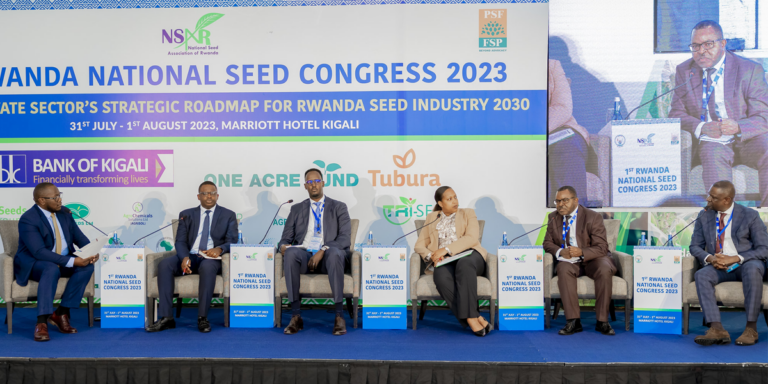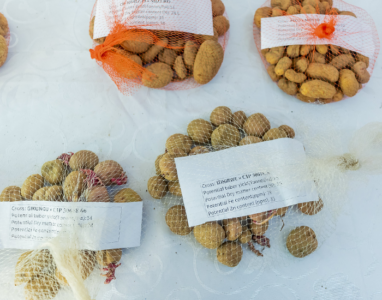
The inaugural Rwanda National Seed Congress, which took place from 31st July to 1st August 2023 in Kigali, marked a significant milestone for the country’s seed industry. The “Private Sector Strategic Roadmap for the Seed Industry 2030” brought together key government and private sector stakeholders to address the challenges and opportunities in the seed value chain.
The National Seed Association of Rwanda (NSAR), the Private Sector Federation, and the Government of Rwanda were commended for their exemplary leadership and commitment to organizing the event, which was a success. The Hon. Minister of Agriculture and Animal Resources, Dr. Ildephonse Musafiri, officially opened the Congress, highlighting its significance.
The Congress discussed pertinent issues concerning the seed industry and the development of the Rwandan National Seed Strategic Roadmap, which provides a comprehensive plan to steer the industry toward success and sustainable growth. The roadmap, which was developed through consultations with various stakeholders in the seed industry, was a significant point of discussion during the Congress.
CGIAR was represented by Gilberthe Benimana from IFPRI, Jean Claude Rubyogo from the Alliance of Bioversity and CIAT, Jummai Yila from IRRI, Jean Claude Nshimiyimana and Dinah Borus from CIP and Chris Ojiewo from CIMMYT, all of whom participate in the CGIAR Seed Equal Research Initiative.
The International Potato Center (CIP) sponsored two participants from the government and public sector engaged in early-generation seed potato production activities: Dr. Athanase Nduwumuremyi -Scientist, Roots and Tubers Research Program Coordinator, Rwanda Agriculture and Animal Resources Development Board (RAB) and Mr. Karegeya Appolinaire, President, Seed Potato Facility (SPF), Joint Ventures, a private seed potato actor. SPF and RAB are project partners for the Partnership for Seed Potato Technology Transfer in Africa (PASTTA2), a 2-year USAID-funded project implemented by CIP in Rwanda.
While presenting his work on public-private partnership as a tool for developing and strengthening the seed sector, Dr. Ojiewo emphasized the necessity of collaboration in seed systems, stating that “No single public entity can handle all aspects of the seed value chain alone… There is no alternative to cooperation and partnerships. The National Seed Association of Rwanda must leverage the comparative advantages of the CGIAR, the NARES, and the private sector.
 The Seed Equal Initiative helps farmers by providing better seeds that can withstand climate change, are preferred in the market, and are nutritious. These varieties have been carefully developed with national partners to exhibit significant genetic advancements that ultimately benefit farmers, emphasizing extending those benefits to women and other marginalized groups.
The Seed Equal Initiative helps farmers by providing better seeds that can withstand climate change, are preferred in the market, and are nutritious. These varieties have been carefully developed with national partners to exhibit significant genetic advancements that ultimately benefit farmers, emphasizing extending those benefits to women and other marginalized groups.
The National Seed Congress ultimately arrived at recommendations for several essential measures to increase the potential of the seed industry in Rwanda. The government was encouraged to seek accreditation with major seed industry quality organizations, such as the International Seed Testing Association (ISTA) and Organization for Economic Cooperation and Development (OECD) certification schemes, while joining the International Union for the Protection of New Varieties of Plants (UPOV) to establish a regulatory environment conducive to industry growth.
The importance of empowering NSAR as an advocate and facilitator for the seed industry was also highlighted during the Congress. Participants indicated that if the seed association can facilitate greater self-regulation in Rwanda’s seed industry—including greater private sector use of internal systems to ensure compliance with public rules and regulations—then the industry could achieve substantial growth in the future.
Congress participants also supported the idea that public-private partnerships (PPPs) were critical to unlocking the potential of Rwanda’s seed sector, boosting seed production, and marking Rwanda as a trade and investment destination.
While outlining the activities of the seven work packages of Seed Equal, Dr. Ojiewo pledged technical support to NSAR through consolidated demand analysis and foresight for grain quality and quantity signals that seed producers and suppliers need for planning, production, and marketing.
“The CGIAR is developing digital seed roadmaps that will be publicly available. The CGIAR is also developing a common licensing framework and other varietal handover approaches that include the consortium model, with the understanding that the private sector has varied capacities for variety development, seed production, and marketing”, he explained.
The Congress also focused on attracting affordable financing to scale up investments throughout the seed value chain. It was considered essential to involve industry financial players in developing optimal financing structures to support the expansion of the industry. Plans are already being made for the second National Seed Congress in 2024 on 29-30 July 2024 in Kigali. They will aim to build on the achievements of the first Congress and further drive the growth of Rwanda’s seed industry.
Prepared by Dr. Chris Ojiewo and Marion Aluoch, CIMMYT CIP-Nairobi, Kenya, and Dr. Dinah Borus, CIP-Nairobi, Kenya
